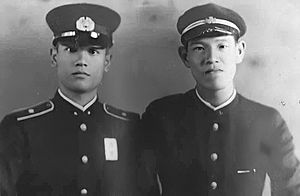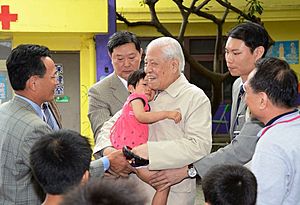Lee Teng-hui facts for kids
Quick facts for kids
Lee Teng-hui
|
|||||||||||||||||||||||||||||||||
|---|---|---|---|---|---|---|---|---|---|---|---|---|---|---|---|---|---|---|---|---|---|---|---|---|---|---|---|---|---|---|---|---|---|
|
李登輝
|
|||||||||||||||||||||||||||||||||
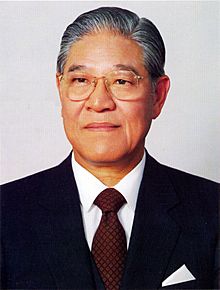
Official portrait, 1999
|
|||||||||||||||||||||||||||||||||
| President of the Republic of China | |||||||||||||||||||||||||||||||||
| In office 13 January 1988 – 20 May 2000 |
|||||||||||||||||||||||||||||||||
| Premier |
|
||||||||||||||||||||||||||||||||
| Vice President |
|
||||||||||||||||||||||||||||||||
| Preceded by | Chiang Ching-kuo | ||||||||||||||||||||||||||||||||
| Succeeded by | Chen Shui-bian | ||||||||||||||||||||||||||||||||
| Vice President of the Republic of China | |||||||||||||||||||||||||||||||||
| In office 20 May 1984 – 13 January 1988 |
|||||||||||||||||||||||||||||||||
| President | Chiang Ching-kuo | ||||||||||||||||||||||||||||||||
| Preceded by | Hsieh Tung-min | ||||||||||||||||||||||||||||||||
| Succeeded by | Li Yuan-tsu | ||||||||||||||||||||||||||||||||
| 2nd Chairman of the Kuomintang | |||||||||||||||||||||||||||||||||
| In office 27 July 1988 – 24 March 2000 Acting: 13 January 1988 – 27 July 1988 |
|||||||||||||||||||||||||||||||||
| Preceded by | Chiang Ching-kuo | ||||||||||||||||||||||||||||||||
| Succeeded by | Lien Chan | ||||||||||||||||||||||||||||||||
| 11th Chairman of Taiwan Provincial Government | |||||||||||||||||||||||||||||||||
| In office 5 December 1981 – 20 May 1984 |
|||||||||||||||||||||||||||||||||
| Preceded by | Lin Yang-kang | ||||||||||||||||||||||||||||||||
| Succeeded by |
|
||||||||||||||||||||||||||||||||
| Mayor of Taipei | |||||||||||||||||||||||||||||||||
| In office 9 June 1978 – 5 December 1981 |
|||||||||||||||||||||||||||||||||
| Preceded by | Lin Yang-kang | ||||||||||||||||||||||||||||||||
| Succeeded by | Shao En-hsin (邵恩新) | ||||||||||||||||||||||||||||||||
| Minister without portfolio | |||||||||||||||||||||||||||||||||
| In office 1 June 1972 – 1 June 1978 |
|||||||||||||||||||||||||||||||||
| Premier | Chiang Ching-kuo | ||||||||||||||||||||||||||||||||
| Personal details | |||||||||||||||||||||||||||||||||
| Born | 15 January 1923 Sanzhi, Taihoku Prefecture, Japanese Taiwan |
||||||||||||||||||||||||||||||||
| Died | 30 July 2020 (aged 97) Taipei Veterans General Hospital, Beitou District, Taipei, Taiwan |
||||||||||||||||||||||||||||||||
| Resting place | Wuzhi Mountain Military Cemetery | ||||||||||||||||||||||||||||||||
| Nationality |
|
||||||||||||||||||||||||||||||||
| Political party | Independent (2001–2020) | ||||||||||||||||||||||||||||||||
| Other political affiliations |
|
||||||||||||||||||||||||||||||||
| Spouse |
Tseng Wen-hui
(m. 1949) |
||||||||||||||||||||||||||||||||
| Education |
|
||||||||||||||||||||||||||||||||
| Occupation | Economist, statesman | ||||||||||||||||||||||||||||||||
| Military service | |||||||||||||||||||||||||||||||||
| Allegiance | |||||||||||||||||||||||||||||||||
| Branch/service | |||||||||||||||||||||||||||||||||
| Years of service | 1944–1945 | ||||||||||||||||||||||||||||||||
| Rank | Second lieutenant | ||||||||||||||||||||||||||||||||
| Battles/wars | Second World War, Pacific War | ||||||||||||||||||||||||||||||||
| Chinese name | |||||||||||||||||||||||||||||||||
| Traditional Chinese | 李登輝 | ||||||||||||||||||||||||||||||||
| Simplified Chinese | 李登辉 | ||||||||||||||||||||||||||||||||
|
|||||||||||||||||||||||||||||||||
| Japanese name | |||||||||||||||||||||||||||||||||
| Kanji | 岩里政男 | ||||||||||||||||||||||||||||||||
| Kana | いわさと まさお | ||||||||||||||||||||||||||||||||
|
|||||||||||||||||||||||||||||||||
Lee Teng-hui (Chinese: 李登輝) was a very important leader in Taiwan. He was born on January 15, 1923, and passed away on July 30, 2020. He was a statesman, which means he was a skilled leader in government, and also an agriculturist, someone who studies farming.
Lee Teng-hui served as the President of the Republic of China (Taiwan) from 1988 to 2000. He was also the chairman of the Kuomintang (KMT) political party during this time. He was special because he was the first president born in Taiwan. He was also the first president to be directly elected by the people.
During his time as president, Lee Teng-hui helped Taiwan become a full democracy. He ended martial law, which was a period when the military had special powers. He also supported the idea of focusing on Taiwan's own culture and identity. People called him "Mr. Democracy" because he helped Taiwan become a democratic country. After his presidency, he continued to be involved in Taiwanese politics.
Contents
Early Life and Education
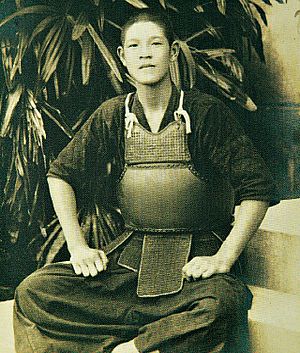
Lee Teng-hui was born in a farming village called Sanshi in Japanese Taiwan. His family was of Hakka descent. When he was a child, he loved collecting stamps and dreamed of traveling. Taiwan was ruled by Japan back then, and he became very interested in Japanese culture. His father worked as a Japanese police aide. His older brother, Lee Teng-chin, joined the Japanese Navy and died in Manila during World War II.
Lee was a very good student. He was one of only four Taiwanese students in his high school class to graduate with honors. He received a scholarship to study at Kyoto Imperial University in Japan. During his school days, he learned kendo, a Japanese martial art. He was also influenced by Japanese thinkers. In 1944, he joined the Imperial Japanese Army and became a second lieutenant. He was in charge of an anti-aircraft gun in Taiwan. He later helped with clean-up efforts after the Great Tokyo Air Raid in 1945. He graduated from Kyoto Imperial University in 1946.
After World War II, Taiwan came under the rule of the Republic of China. Lee then studied at the National Taiwan University. In 1948, he earned a bachelor's degree in agricultural science. For a short time, he was a member of the Communist Party of China. He later said he joined because he disliked the Kuomintang party at the time. He left the Communist Party in 1948 and later strongly opposed Communism.
In 1953, Lee earned a master's degree in agricultural economics from Iowa State University in the United States. He returned to Taiwan in 1957. He worked as an economist, helping to modernize Taiwan's farming system. He also taught at National Taiwan University.
Lee went back to the United States in the mid-1960s. In 1968, he earned his PhD in agricultural economics from Cornell University. His doctoral paper was about how money flowed between different parts of Taiwan's economy. This paper was recognized as the best doctoral thesis that year.
Lee became a Christian in 1961. He was a member of the Presbyterian Church in Taiwan. Even when he held high government positions, he often gave sermons in churches. Lee's first language was Taiwanese Hokkien. He also spoke Mandarin and Japanese very well, and could speak English.
Path to Presidency
After returning to Taiwan, Lee joined the KMT party in 1971. He became a cabinet minister, focusing on agriculture.
In 1978, Lee was chosen to be the mayor of Taipei. He helped solve water shortages and improved the city's irrigation. In 1981, he became the governor of Taiwan Province and continued to improve irrigation.
Lee was a skilled expert in his field. President Chiang Ching-kuo noticed him and thought he would be a good vice president. Chiang wanted to give more power to people born in Taiwan, known as bensheng ren. So, President Chiang nominated Lee to be his Vice President of the Republic of China. Lee was officially elected by the National Assembly in 1984.
Lee Teng-hui's Presidency
When President Chiang Ching-kuo passed away in January 1988, Lee Teng-hui became president. Some conservative members of the KMT party were unsure about Lee. However, with help from others, Lee was able to become the chairman of the KMT. In July 1988, Lee made a big change. He appointed many bensheng ren (people born in Taiwan) to important positions in the KMT. This was the first time they held a majority in the party's main decision-making group. He also ordered the release of political prisoners.
As he gained more power, Lee allowed some of his rivals in the KMT to hold important jobs. At the same time, he brought in younger, well-educated people, many of whom had studied in the United States.
Push for Democracy
In 1990, many students protested for full democracy in Taiwan. This was called the Wild Lily student movement. Thousands of students demonstrated for reforms. They wanted the president and vice president to be directly elected by the people. On March 21, Lee met with some students. He supported their goals and promised to bring full democracy to Taiwan.
In May 1991, Lee led an effort to remove old laws that had limited democratic functions since 1949. In December 1991, older members of the legislature were asked to resign. New elections were held to give more seats to people born in Taiwan. These changes helped push Taiwan towards more democracy.
First Direct Presidential Election
The first island-wide democratic election was planned for 1996. Lee's visit to Cornell University in the US in 1995 caused some tension with mainland China. China saw this as a move by Lee to separate Taiwan from China. China conducted missile tests in the waters around Taiwan. They also held military drills to show their disapproval.
However, these actions actually made more people support Lee. On March 23, 1996, Lee became the first president of the Republic of China to be chosen by popular vote, winning 54% of the votes. Many Taiwanese living abroad even returned home just to vote. Besides the president, the governor of Taiwan Province and the mayors of Taipei and Kaohsiung were also directly elected by the people for the first time.
| 1996 Republic of China presidential election Result | ||||
|---|---|---|---|---|
| President Candidate | Vice President Candidate | Party | Votes | % |
| Lee Teng-hui | Lien Chan | 5,813,699 | 54.0 | |
| Peng Ming-min | Frank Hsieh | Democratic Progressive Party | 2,274,586 | 21.1 |
| Lin Yang-kang | Hau Pei-tsun | 1,603,790 | 14.9 | |
| Chen Li-an | Wang Ching-feng | 1,074,044 | 9.9 | |
| Invalid/blank votes | 117,160 | |||
| Total | 10,883,279 | 100 | ||
Lee believed that Taiwan and mainland China had a "special state-to-state relationship." He tried to reform the government further. He also supported the Taiwanese localization movement. This movement focused on promoting Taiwanese culture and history, rather than just Chinese culture. In 1997, he oversaw the creation of a history textbook called Knowing Taiwan, which focused on Taiwan's own story.
Lee followed the rules he helped create for presidential terms. He stepped down from the presidency in 2000. That year, Chen Shui-bian from the Democratic Progressive Party won the election. This was the first time power was peacefully transferred to an opposition party in Taiwan's new democracy.
After the Presidency
After leaving his role as KMT chairman, Lee shared more of his political ideas. He supported the Taiwan Solidarity Union, a new party formed by some of his former allies. Because of this, he was removed from the KMT party in 2001.
Lee publicly supported changing Taiwan's official name from the Republic of China to the Republic of Taiwan. He also generally believed that Taiwan should limit its economic ties with mainland China.
Lee had a close relationship with the next president, Chen Shui-bian, at first. Chen even called Lee the "Father of Taiwanese Democracy." However, their relationship became difficult later on. In 2006, Lee publicly criticized Chen.
In 2007, Lee surprised many by saying he did not support formal Taiwanese independence. He explained that Taiwan already acts like an independent country. He believed Taiwan should focus on becoming "normal" by changing its name and constitution.
Taiwan's Relationship with Japan
Lee Teng-hui had a good relationship with Japan and its culture. Taiwan was under Japanese rule from 1895 to 1945. People like Lee, who grew up during that time, learned Japanese language and culture in school. Lee's father worked for the Japanese police, and his older brother died serving in the Japanese Navy during World War II. Lee himself had a Japanese name, Iwasato Masao, when he was young.
Lee often spoke positively about his Japanese upbringing and teachers. He was welcomed during his visits to Japan after leaving office. He admired many Japanese traditions. This was sometimes criticized by some groups in Taiwan and China, due to historical tensions from World War II. However, these negative feelings lessened over time, especially in Taiwan.
In 1989, he received a high honor from the Scout Association of Japan.
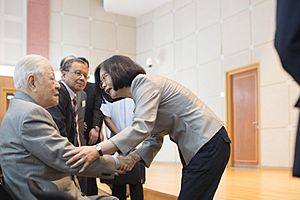
In 2015, Lee visited Japan and stated that Japan had full control over the Senkaku Islands. This caused some controversy in Taiwan, with some accusing him of treason. Lee also said that Taiwanese people were "subjects of Japan" and that Taiwan and Japan were "one country." This also drew criticism from mainland China and some Taiwanese groups.
In 2016, Lee published a book called Remaining Life: My Life Journey and the Road of Taiwan's Democracy. In this book, he again supported Japan's claim over the Senkaku Islands. He visited Japan for the last time in 2018.
Personal Life and Family
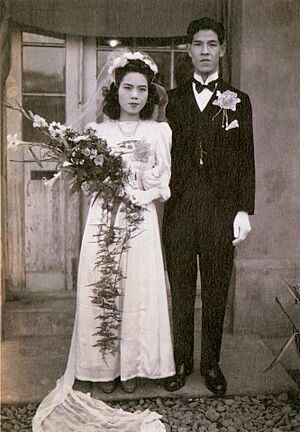
Lee and his wife, Tseng Wen-hui, were Presbyterian Christians. They got married on February 9, 1949. They had three children. Their son, Lee Hsien-wen, passed away in 1982 from cancer. They also had two daughters, Anna and Annie.
Death and Legacy
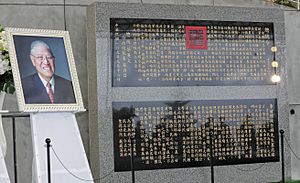
Lee Teng-hui passed away on July 30, 2020, at the age of 97. He died from multiple organ failure and an infection. He had been in the hospital since February.
Taiwan held a state funeral for him. A special place was set up for people to pay their respects. After his body was cremated, his remains were buried at the Wuzhi Mountain Military Cemetery. National flags were flown at half-mast for three days to honor him.
Lee was known as "Mr. Democracy" and the "Father of Democracy" in Taiwan. This was because he worked hard to make Taiwan's government democratic. He also stood against the Communist rule in mainland China.
Some members of the KMT party blame Lee for their party losing power. They believe his actions caused the KMT to split. However, the Democratic Progressive Party (DPP) sees Lee in a positive way. The DPP grew stronger during his presidency. He also set an important example by overseeing the first peaceful transition of power to an opposition party in 2000.
A survey in November 2020 asked Taiwanese citizens which president had the best leadership after Taiwan became a democracy. Lee Teng-hui was chosen by 43% of the people, showing his lasting positive impact.
Honours
Images for kids
See also
 In Spanish: Lee Teng-hui para niños
In Spanish: Lee Teng-hui para niños
 | Jackie Robinson |
 | Jack Johnson |
 | Althea Gibson |
 | Arthur Ashe |
 | Muhammad Ali |


